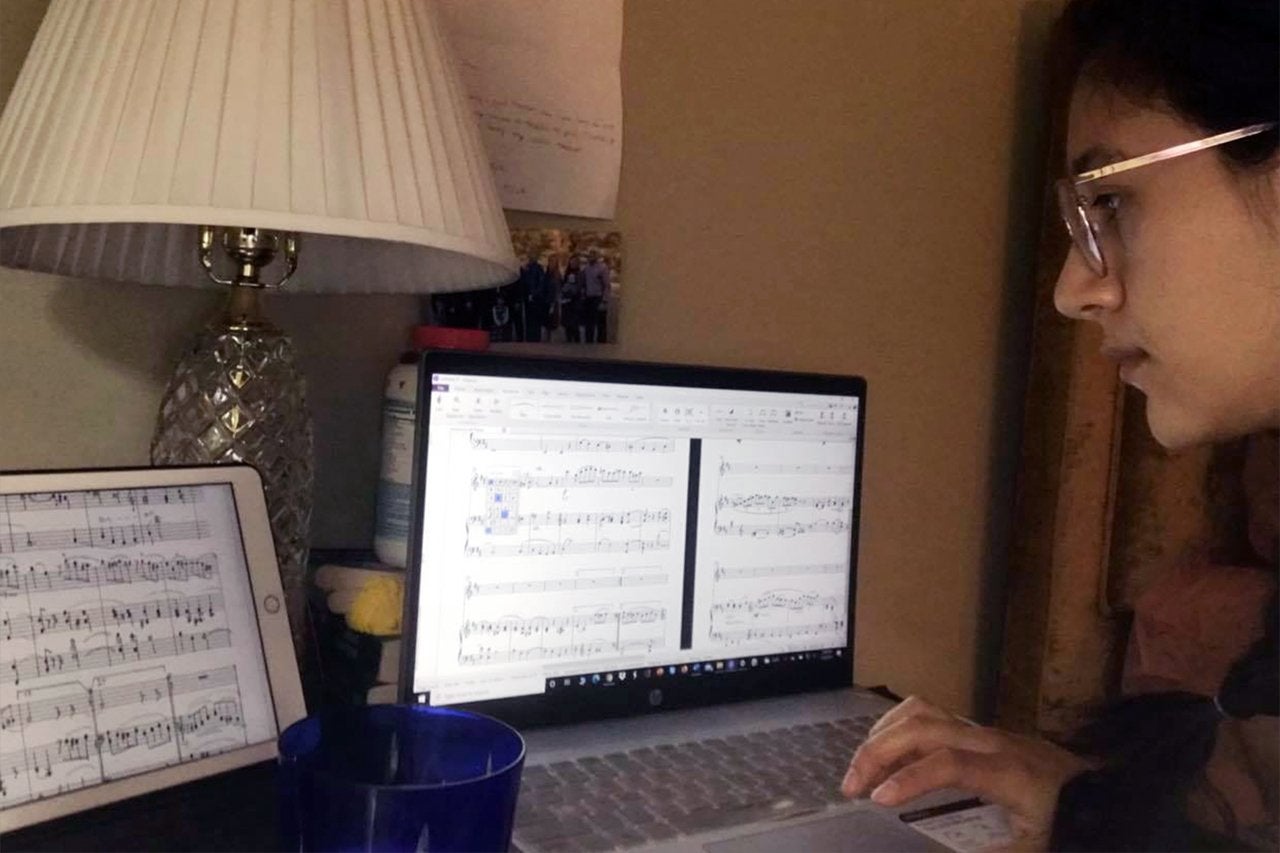Above: Laura Maria Diaz Coronado studies works by Guatemalan composer Joaquín Orellana.
The College of Charleston Orchestra on Nov. 29, 2021, will present the performance “Two Geniuses: Tchaikovsky and Orellana,” conducted by Yuriy Bekker. Hosted by the College’s Department of Music, the performance will include the U.S. premiere of 91-year-old Joaquín Orellana’s “Ballet Contrastes.” The concert will also feature beloved, late-Romantic Tchaikovsky masterpieces “Symphony no. 5” and “Variations on a Rococo Theme,” featuring cellist Maria Savelyeva. The concert will take place at 7:30 p.m. at the Sottile Theatre (44 George St.).
Orellana’s work came to the attention of Bekker through a research project conducted by music and computer science double major Laura Maria Diaz Coronado, under the guidance of Michael O’Brien, associate professor of ethnomusicology and chair of the music department. Funded through the College’s Summer Undergraduate Research with Faculty (SURF) grant program, Diaz researched, digitized and documented the composer’s work in an effort to bring attention to his musical compositions.
“Joaquín Orellana is an experimental Guatemalan composer, instrument creator and violinist. His early work, while stylistically traditional, won several important international awards,” says Diaz. “His career was transformed, however, by a residence at the Latin American Center for Advanced Musical Studies at the Instituto Torcuato Di Tella in Buenos Aires, Argentina, where some of Latin America’s most elite and imaginative composers shared their work with leading composers from the U.S. and Europe.”
His mastery of experimental composition transformed him into an inventor of “sound tools” – modernist instruments based on the Guatemalan indigenous marimba. While breathtakingly inventive, his work is not widely studied, but Diaz and her mentors have set out to change that. Through her SURF grant research, they aim to study Orellana’s post-institutional career and how Guatemala’s troubled history during the 1960s-80s interfered with both Orellana’s musical production and with audiences and scholars.
A native of Guatemala herself, Diaz learned that Orellana felt political convictions that his music should reflect and engage with the social realities of his own country, rather than merely reflect European conventions and interests. His inventive compositions, shaped by de-colonial ideologies, lend a sound totally different than even Europe’s most imaginative composers. The Charleston community will experience this sound in the performance of his “Ballet Contrastes,” which features innovative concepts including a part for “tape” (in effect, recorded voices mixed with synthesized sounds) — an unusual addition in 1966, when it was originally written for the Guatemalan National Symphony.
Diaz’s favorite part of the project was getting the chance to conduct a Zoom interview with Orellana, whom she describes as “an amazing character and interesting composer.”
O’Brien says when he and Bekker, who is the Charleston Symphony concertmaster and an adjunct faculty member at the College, settled on the orchestra performing Orellana’s “Ballet Contrastes,” they had no idea it would be an American premier. As it turned out the “tape” part of the piece had degraded and was no longer accessible, but that didn’t hinder plans for the composer’s big moment in Charleston.
“The prospect of an American orchestra reviving this work was exciting enough that it sent the 91-year-old composer and several assistants back into the recording studio to re-record that part, so our audience will hear his voice along with other surprising sounds during the premiere,” says O’Brien. “It’s also attracted the attention of an arts journalist from Guatemala, who will be traveling to Charleston to cover the performance.”
Tchaikovsky’s evocative work weaves seamlessly with Orellana’s experimentally colorful pieces. Audiences are invited to hear the U.S. debut of these sounds as the College’s orchestra, which includes both music and non-music majors as well as professional musicians, melds the works of Tchaikovsky and Orellana into a full cultural experience. This performance, which intertwines culture, history, politics and research, is an opportunity to learn directly from the researchers and musicians inspired by the inventive works or Orellana. After the concert, Diaz, Bekker and O’Brien will conduct a brief Q&A to share the process of rediscovering and bringing back to life Orellana’s “Ballet Contrastes. ”
General admission is $20. Admission is FREE for those 18 and under as well as College of Charleston students, faculty and staff. Tickets can be purchased through the George Street Box Office online, by calling 843.953.4726 or emailing [email protected]. Patrons can find concert information, ticket links and updates at go.cofc.edu/music-ensembles.
Hannah-Marie Wayne is a graduate student in the Master of Public Administration program.





